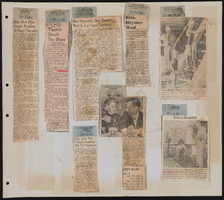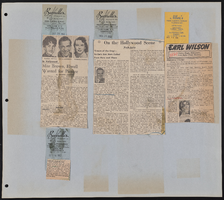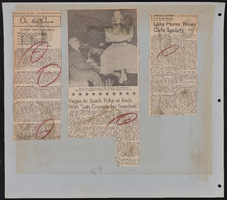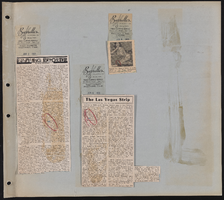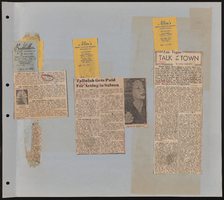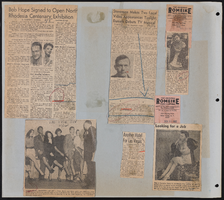Search the Special Collections and Archives Portal
Search Results

Transcript of interview with Cynthia Cicero, Tina Boag, Betty Brown, and Jan Ravetti by Claytee D. White, March 28, 2014
Date
2014-03-28
Archival Collection
Description
Four women, Cynthia Cicero, Betty Brown, Tina Boag, and Jan Ravetti, recall coming to Las Vegas to obtain jobs during the period of mob ownership in the Las Vegas hotels. Each had a different reason for coming. A recession in Buffalo, New York, brought Cynthia and her husband to Las Vegas to obtain employment; Jan Ravetti’s family moved from Pennsylvania due to her father’s illness and possible employment; parents of Tina Boag, who was born in Paris, were entertainers who travelled and performed extensively; and Milton Prell, opening the Aladdin Hotel and Casino, encouraged Californian Betty Brown to work for him. Cynthia Cicero obtained a job with the City of Las Vegas, but the other three worked on the Strip in the casinos. Their experiences in the hotels show the differences between mob and corporate management since they were working there before and after Howard Hughes purchased six of the large Vegas hotels. The four ladies tell about their work on the Strip from Betty’s experience as a genie at the Aladdin to Tina’s position as a twenty-one dealer. They were acquainted with the casino owners and managers, entertainers like Sammy Davis, Jr. and Dean Martin, and show girls. They also knew first-hand the interactions between mobsters and the public. Food, for example, was a giveaway, an enticement for people to come into the hotel to gamble. They also knew stories about high rollers, the robbery of the baccarat tables at Caesars Palace, and the importance of “taking a fall” including the rewards attached. The ladies describe the shops on downtown Fremont Street and the Strip such as Nina Clark’s, Ronzones, Dillards and Chic Hecht’s as well as Penneys and Sears. A young woman shopped at Suzie Cream Cheese, for example, for the right outfit to wear to Pussy Cat A Go-Go, the rock and roll club on the Strip. Las Vegas also had many good gourmet and ethnic restaurants, piano bars, hotel lounges, and pubs with excellent entertainment. The ladies also describe the difference in the treatment of women during the 1960s and 1970s by men in clubs. Women rarely bought drinks nor did they pay for dinners when with gentlemen. Finally, the ladies compare areas where they lived including McNeil Estates, Heritage Square and the Chisholm-built homes in the Jones-Vegas Drive area. Not to be forgotten, however, are the terrible rain storms that flood streets and the Strip. Serious gamblers in the casinos refused to leave the tables while drenching rains washed cars from the hotel parking lots during the 1970s. Neither did they leave the MGM casino when the hotel caught on fire in1980.
Text

Transcript of interview with Sharon and Henry Hwang by Stefani Evans and Claytee D. White, February 21, 2017
Date
2017-02-21
Archival Collection
Description
"There's nothing really authentic here. I'm kind of tired of the buffet already." In the early 1990s, Henry Hwang, recent emigrant from Taiwan, listened as his Los Angeles neighbors returned from gambling trips to Las Vegas and complained that they could find no good Chinese restaurants in the Entertainment Capital of the World. They continued to visit Las Vegas, but after two or three days they grew tired of buffet dining and searched in vain for a place to enjoy a good Chinese meal. Having been a businessman in Taiwan, Hwang recognized an opportunity. He envisioned creating a space in Las Vegas that would serve tourists and the local Asian population alike. It would have not only good Chinese restaurants, but it would also have top-brand Asian supermarkets. With his wife and two partners, Hwang set about to realize his vision. In this interview, Henry and his daughter, Sharon Hwang, talk about their lives in Taiwan and beginning anew in Las Vegas. They talk about Henry’s search for the right parcel in a good location and about working with the architect to create a center true to Tang dynasty architecture and symbolism. They also share the story of the Journey to the West as the cultural strength of the center and have held annual Chinese New Year celebrations to teach Chinese culture for 23 years. The elements of location, architecture, and culture combined to grow Chinatown Mall beyond Henry’s original idea and inspired other Asian businesses to locate nearby. West Spring Mountain Road became a bustling pan-Asian district that caters to many local and tourist communities as well as to Las Vegas’s hospitality industry. In 1996 Clark County officially designated the area as Chinatown District, and in 1999, Nevada Governor Kenny Guinn officially named as Chinatown the three-mile stretch of Spring Mountain Road from Las Vegas Boulevard to Rainbow Boulevard. Henry also shares his reasons for leaving Taiwan and pursuing life in Las Vegas. He, his wife, and one of the original partners still own Chinatown Mall, but Henry has ceded its operation to Sharon, who oversees and nurtures the Mall’s cultural and financial pillars equally. Sharon talks about the difficulty of entering Durango High School as a new immigrant and her wonderment at the give-and-take of classroom discussions. A member of Durango’s first graduating class, she recalls her time at the University of Nevada, Las Vegas (UNLV), where she earned her B.A. degree in business administration in 1999. Sharon is proud of her father and mentor—his innovative thinking, business vision, and strong work ethic—and she is delighted to call Las Vegas home.
Text
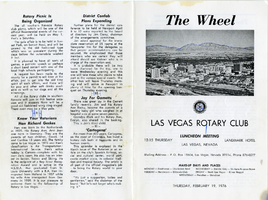
The Wheel Las Vegas Rotary Club newsletter, February 19, 1976
Date
1976-02-19
Archival Collection
Description
Newsletter issued by the Las Vegas Rotary Club
Text
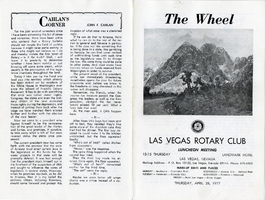
The Wheel Las Vegas Rotary Club newsletter, April 28, 1977
Date
1977-04-28
Archival Collection
Description
Newsletter issued by the Las Vegas Rotary Club
Text
Pagination
Refine my results
Content Type
Creator or Contributor
Subject
Archival Collection
Digital Project
Resource Type
Year
Material Type
Place
Language
Records Classification

